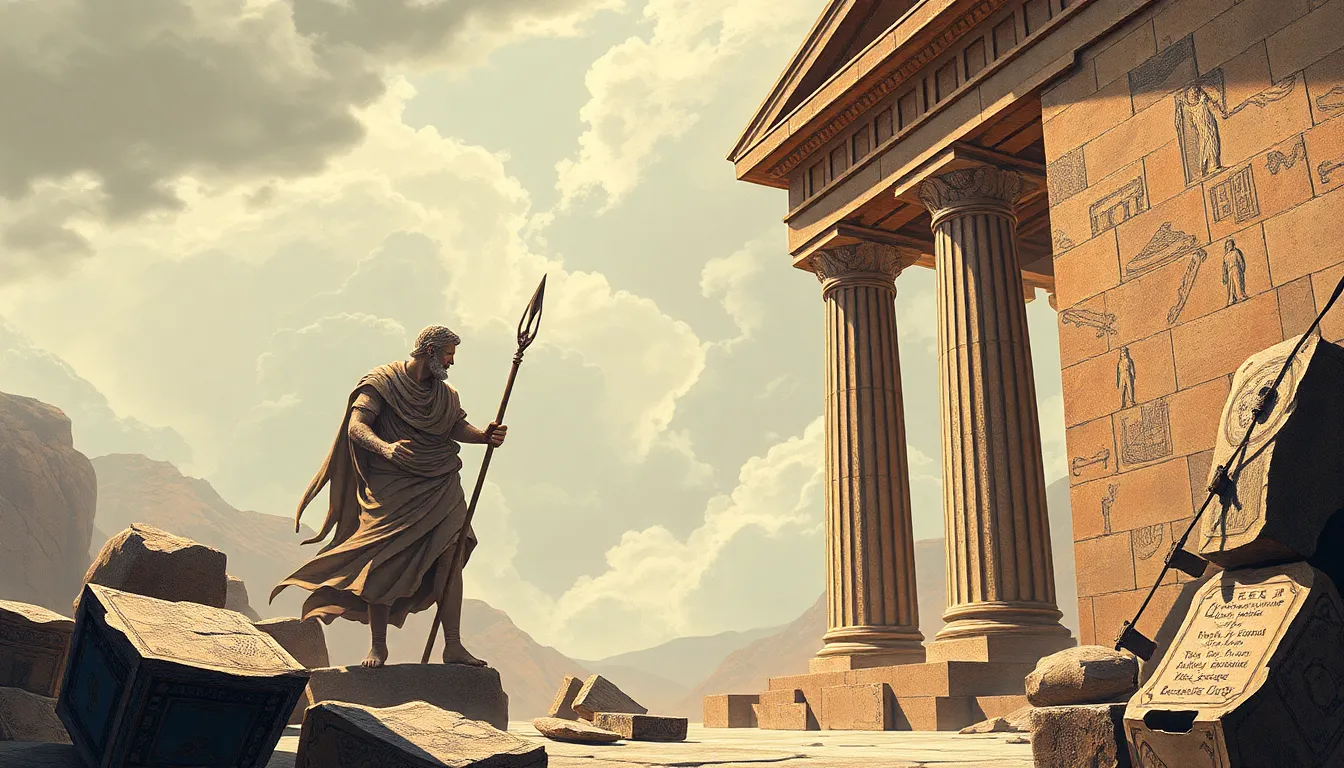The Role of Fate in Mortal Lives: Lessons from Greek Myths
I. Introduction
Fate, in the context of Greek mythology, refers to the predetermined course of events that is often beyond human control. It represents a powerful force that shapes the lives of mortals, dictating their paths and ultimately leading them to their destinies. The significance of fate in mortal lives cannot be overstated, as it serves as a central theme in many Greek myths, illustrating the tension between destiny and free will.
The purpose of this article is to delve into the lessons learned from Greek myths regarding fate. By exploring various myths and their implications, we can gain a deeper understanding of how fate influences human lives and the moral lessons that emerge from these timeless stories.
II. Understanding Fate in Greek Mythology
The concept of the Moirai, or the Fates, is fundamental to understanding fate in Greek mythology. The Moirai are three sisters: Clotho, who spins the thread of life; Lachesis, who measures it; and Atropos, who cuts it. Their role is to determine the destiny of every individual, highlighting the inevitability of fate.
It is important to distinguish between fate and free will. While fate represents the predetermined outcomes of life, free will allows individuals to make choices within the constraints set by fate. This duality creates a rich tapestry of conflict and resolution in Greek myths.
Throughout various myths, fate is portrayed as an inescapable force. For instance, in the story of Oedipus, despite his attempts to avoid his fate, he ultimately fulfills the prophecy that he will kill his father and marry his mother. Such examples illustrate the pervasive nature of fate in mortal existence.
III. Fate and Heroism: The Duality of Destiny
Greek heroes often find themselves in direct conflict with their fates. They may attempt to resist or alter their destinies, leading to profound struggles and ultimately, tragic outcomes. This duality of destiny highlights the human condition and the quest for meaning in a seemingly predetermined world.
A quintessential case study is that of Achilles. According to prophecy, Achilles would die young in battle, which he struggles with throughout his life. His choice to join the Trojan War, despite knowing the cost, emphasizes the impact of accepting or resisting fate. Achilles’ story demonstrates that while one may struggle against fate, the outcome remains unchanged.
IV. The Influence of the Gods on Mortal Fate
Divine intervention plays a crucial role in shaping mortal fates. The gods often manipulate events to fulfill their desires, highlighting the complexities of fate and free will. This divine influence can lead to significant consequences for mortals, reinforcing the idea that fate is not solely a product of human actions.
A prominent case study is the story of Oedipus. The prophecy regarding Oedipus was foretold by the oracle, and despite his efforts to evade it, he ultimately fulfills the fate laid out for him. This narrative illustrates the inescapability of fate and poses moral questions about the extent to which divine forces control human lives.
V. Lessons from Tragic Figures
Tragic heroes in Greek mythology often embark on fateful journeys that reveal the limitations of human agency. Their stories serve as cautionary tales about the consequences of pride, passion, and the struggle against fate.
One such figure is Medea, who embodies the complexities of fate and revenge. Driven by love and betrayal, her actions lead to devastating consequences, illustrating how personal choices can intertwine with fate. Medea’s tragic journey highlights the role of tragedy in understanding human limits and the moral lessons that arise from her fate.
VI. Fate and the Concept of Time
The cyclical nature of fate in Greek myths is a significant theme, emphasizing how past actions resonate through time and shape future outcomes. Time plays a crucial role in characters’ acceptance of their destinies, as many realize the futility of resisting fate.
The philosophical implications of fate’s timing suggest that events unfold according to a cosmic order, often beyond human comprehension. This understanding of time and fate invites reflection on the nature of existence and the inevitability of life’s progression.
VII. Modern Interpretations of Fate in Greek Myths
The lessons of fate in Greek mythology remain relevant in contemporary society. The struggles of characters against their fates resonate with modern audiences, reflecting ongoing debates about destiny and free will.
Greek myths have influenced modern literature and psychology, providing frameworks for exploring human behavior and the complexities of choice. Writers and thinkers continue to engage in the dialogue about fate and free will, drawing inspiration from these ancient stories.
VIII. Conclusion
In conclusion, the exploration of fate in Greek mythology reveals profound insights about the role of destiny in mortal lives. The intricate relationships between fate, free will, and divine influence provide a rich narrative landscape that continues to shape our understanding of existence.
As we reflect on the lessons from these myths, we recognize that while fate may guide our paths, human agency still plays a vital role in how we navigate our journeys. The balance between fate and human choice remains a timeless theme, inviting us to ponder our own destinies in the context of a larger cosmic order.




